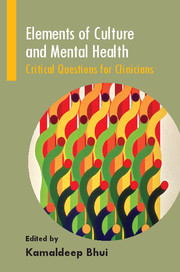Book contents
- Frontmatter
- Contents
- List of contributors
- Foreword: Desire and commitment: essential ingredients in learning about culture and mental illness
- 1 Is trauma-focused therapy helpful for survivors of war and conflict?
- 2 Will ethnopsychopharmacology lead to changes in clinical practice?
- 3 Does cognitive–behavioural therapy work for people with very different cultural orientations and backgrounds?
- 4 Can you do meaningful cognitive–behavioural therapy through an interpreter?
- 5 Are particular psychotherapeutic orientations indicated with specific ethnic minority groups?
- 6 Can psychotherapeutic interventions overcome epistemic difference?
- 7 On the role of culture and difference in evaluation, assessment and diagnosis
- 8 Necessary and sufficient competencies for intercultural work
- 9 On the validity and usefulness of existing Eurocentric diagnostic categories
- 10 Benefits and limitations of the cultural formulation in intercultural work
- 11 Barriers to the intercultural therapeutic relationship and how to overcome them
- 12 How does intercultural interpretation work in the mental health setting?
- 13 Do the power relations inherent in medical systems help or hinder in cross-cultural psychiatry?
- 14 Recovery and well-being: a paradigm for care
- 15 Social perspectives on diagnosis
- 16 Public mental health and inequalities
- 17 Can you do psychotherapy through an interpreter?
- 18 Can race and racism be acknowledged in the transference without it becoming a source of therapeutic impasse?
- 19 Cultural competence: models, measures and movements
- 20 Religion, spirituality and mental health
- Index
20 - Religion, spirituality and mental health
Published online by Cambridge University Press: 01 January 2018
- Frontmatter
- Contents
- List of contributors
- Foreword: Desire and commitment: essential ingredients in learning about culture and mental illness
- 1 Is trauma-focused therapy helpful for survivors of war and conflict?
- 2 Will ethnopsychopharmacology lead to changes in clinical practice?
- 3 Does cognitive–behavioural therapy work for people with very different cultural orientations and backgrounds?
- 4 Can you do meaningful cognitive–behavioural therapy through an interpreter?
- 5 Are particular psychotherapeutic orientations indicated with specific ethnic minority groups?
- 6 Can psychotherapeutic interventions overcome epistemic difference?
- 7 On the role of culture and difference in evaluation, assessment and diagnosis
- 8 Necessary and sufficient competencies for intercultural work
- 9 On the validity and usefulness of existing Eurocentric diagnostic categories
- 10 Benefits and limitations of the cultural formulation in intercultural work
- 11 Barriers to the intercultural therapeutic relationship and how to overcome them
- 12 How does intercultural interpretation work in the mental health setting?
- 13 Do the power relations inherent in medical systems help or hinder in cross-cultural psychiatry?
- 14 Recovery and well-being: a paradigm for care
- 15 Social perspectives on diagnosis
- 16 Public mental health and inequalities
- 17 Can you do psychotherapy through an interpreter?
- 18 Can race and racism be acknowledged in the transference without it becoming a source of therapeutic impasse?
- 19 Cultural competence: models, measures and movements
- 20 Religion, spirituality and mental health
- Index
Summary
The past decade has seen a surge of interest among health professionals in the integration of religious and spiritual matters into mental healthcare. However, this forgotten dimension has played a significant role in many people's lives for centuries. It may come as a surprise to find that the first psychiatric hospitals were built in Baghdad in 705 ad, and in Cairo in 800 ad (Youssef & Youssef, 1996). Religious therapy was an integral part of treatment in these early institutions.
Many authors offer definitions of the concept of spirituality in relation to healthcare. These include having a sense of purpose, searching for peace, understanding the world, and engaging in practices that give meaning to individual lives. However, one needs to define spirituality with care in order not to narrow its meaning too far: any definition should reflect spirituality' importance in giving meaning to experiences (Rumbold, 2007) and be inclusive of diverse religious views (Canda & Furman, 2010).
A potential shortcoming of existing practice is the use of generic spiritual assessment tools without considering the underlying assumptions inherent in the healthcare systems for which they are developed (Rumbold, 2007). Many hospitals have developed resource files listing religious and spiritual rituals and ‘dos and don's’, but these often overlook the deeper meanings behind people's religious beliefs and attitudes and how these affect their mental health and well-being.
Many people with mental health problems want their spiritual needs to be addressed, but often lack confidence in nursing staff and fear being misunderstood (Koslander & Arvidsson, 2007). In a US survey of 1413 patients visiting family practices, of the 921 respondents, 83% wanted physicians to ask about their spiritual beliefs under certain circumstances (McGord et al, 2004). Spirituality offers moments of reflection, opportunity to search for change; without these moments something is missing (Dadich, 2007). Spiritual beliefs can play a positive role in mental health and suicide prevention (Coghlan & Ali, 2009). Incorporating spirituality in the care of people with schizophrenia can promote coping strategies and help with recovery (Mohr & Huguelet, 2004). Religious beliefs and practices are commonly used to help people cope with mental distress.
- Type
- Chapter
- Information
- Elements of Culture and Mental HealthCritical Questions for Clinicians, pp. 87 - 90Publisher: Royal College of PsychiatristsPrint publication year: 2013

